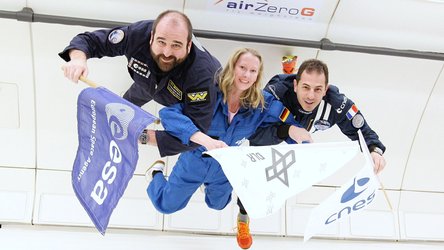Accept all cookies Accept only essential cookies See our Cookie Notice

About ESA
The European Space Agency (ESA) is Europe’s gateway to space. Its mission is to shape the development of Europe’s space capability and ensure that investment in space continues to deliver benefits to the citizens of Europe and the world.
Highlights
ESA - United space in Europe
This is ESA ESA facts Member States & Cooperating States Funding Director General Top management For Member State Delegations European vision European Space Policy ESA & EU Space Councils Responsibility & Sustainability Annual Report Calendar of meetings Corporate newsEstablishments & sites
ESA Headquarters ESA ESTEC ESA ESOC ESA ESRIN ESA EAC ESA ESAC Europe's Spaceport ESA ESEC ESA ECSAT Brussels Office Washington OfficeWorking with ESA
Business with ESA ESA Commercialisation Gateway Law at ESA Careers Cyber resilience at ESA IT at ESA Newsroom Partnerships Merchandising Licence Education Open Space Innovation Platform Integrity and Reporting Administrative Tribunal Health and SafetyMore about ESA
History ESA Historical Archives Exhibitions Publications Art & Culture ESA Merchandise Kids Diversity ESA Brand Centre ESA ChampionsLatest
Space in Member States
Find out more about space activities in our 23 Member States, and understand how ESA works together with their national agencies, institutions and organisations.
Science & Exploration
Exploring our Solar System and unlocking the secrets of the Universe
Go to topicAstronauts
Missions
Juice Euclid Webb Solar Orbiter BepiColombo Gaia ExoMars Cheops Exoplanet missions More missionsActivities
International Space Station Orion service module Gateway Concordia Caves & Pangaea BenefitsLatest
Space Safety
Protecting life and infrastructure on Earth and in orbit
Go to topicAsteroids
Asteroids and Planetary Defence Asteroid danger explained Flyeye telescope: asteroid detection Hera mission: asteroid deflection Near-Earth Object Coordination CentreSpace junk
About space debris Space debris by the numbers Space Environment Report In space refuelling, refurbishing and removingSafety from space
Clean Space ecodesign Zero Debris Technologies Space for Earth Supporting Sustainable DevelopmentLatest
Applications
Using space to benefit citizens and meet future challenges on Earth
Go to topicObserving the Earth
Observing the Earth Future EO Copernicus Meteorology Space for our climate Satellite missionsCommercialisation
ESA Commercialisation Gateway Open Space Innovation Platform Business Incubation ESA Space SolutionsLatest
Enabling & Support
Making space accessible and developing the technologies for the future
Go to topicBuilding missions
Space Engineering and Technology Test centre Laboratories Concurrent Design Facility Preparing for the future Shaping the Future Discovery and Preparation Advanced Concepts TeamSpace transportation
Space Transportation Ariane Vega Space Rider Future space transportation Boost! Europe's Spaceport Launches from Europe's Spaceport from 2012Latest
31st Parabolic Flight Campaign
Every year a group of European scientist get the chance to experience weightlessness in an initiative from ESA. They are able to conduct their experiment as they go up ina special plane that can create the same conditions as in space.
In parabolic flight, the aircraft is put into a specially-shaped trajectory that provides free-fall, or weightlessness. This weightless experience, other than the duration, is exactly that experienced by astronauts on orbital missions. Each flight begins by having theaircraft perform an aerobatic manoeuvre, which starts from level flight, and pitches up to apporximately 45 degrees nose-hight and wingls level subjecting the passengers to a 2 g pull up lasting about ten seconds. After that, the aircraft engines are powered back and the airplane is launched into the same parabolic trajectory that a ball would follow, providing everyone inside the plane with around twenty-five to thirty seconds of total weightlessness for experimentation puroposes. At the bottom of the parabol
00:00:38 Slate: 31st Parabolic Flight Campaign
00:00:57 Plane Liftoff
00:01:10 Introduction
00:02:42 PHYSICAL SCIENCE EXPERIEMENTS
00:03:03 Liquid diffusion model experiment in low gravity (Dr G. Mathiak, Dr R, Willnecker, (DLR Koln) Dr A. Griesche, Prof G. Frohberg (TU Berlin))
00:04:25 Linear Diffusion flames representative of fires in microgravity environments (Prof P. Joulain, CHRS Poitiers, France)
00:06:03:08 Preliminary tests for the International MIcrogravity Plasma Facility (Prof G. MOfgill, Dr H. Thomas, Dr U. Konopka, (Max Plank INsititute, Garcheng, Germany))
00:07:32n Test of ICAPS facility for International space Station (Prof Blum (University of Jena, Germany))
00:08:56 Aerosol particle motion in temperature and concentration gradient (Prof J C. Legros, D A. Vedernikov (universite libre de Bruxelles, Belgium))
00:10:15 LIFE SCIENCE EXPERIMENTS
00:10:39 Dynamics of prehension in microgravity and its application to robotics and prosthetics (Prof J L. Thonnard, Dr O. White (universite ca
-
CREDIT
ESA -
LICENCE
ESA Standard Licence
-
Index
-
-
-

ESA’s 71st parabolic flight campaign experiments

Parabolic flight experiment

Weightless science aircraft – 4K

Microgravity mixing















 Germany
Germany
 Austria
Austria
 Belgium
Belgium
 Denmark
Denmark
 Spain
Spain
 Estonia
Estonia
 Finland
Finland
 France
France
 Greece
Greece
 Hungary
Hungary
 Ireland
Ireland
 Italy
Italy
 Luxembourg
Luxembourg
 Norway
Norway
 The Netherlands
The Netherlands
 Poland
Poland
 Portugal
Portugal
 Czechia
Czechia
 Romania
Romania
 United Kingdom
United Kingdom
 Slovenia
Slovenia
 Sweden
Sweden
 Switzerland
Switzerland

























